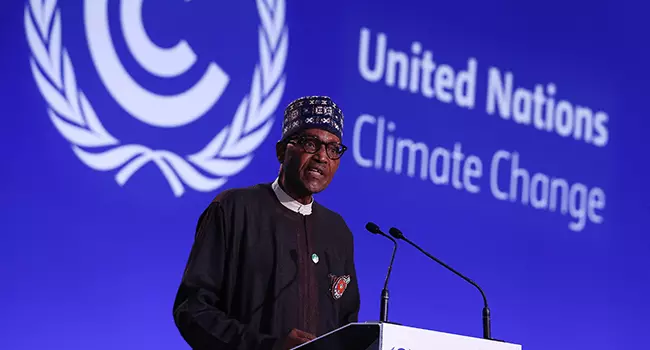
On November 2, 2021, Nigerian President Muhammadu Buhari makes a national declaration during the COP26 UN Climate Summit in Glasgow. DENNIS, Adrian / AFP / POOL
President Muhammadu Buhari remarked on Tuesday that during a ten-year period, Nigeria will require 1.5 trillion dollars to achieve an acceptable level of the National Infrastructure Stock.
According to a statement signed by presidential spokesperson Garba Shehu, President Buhari gave the figure in Glasgow at a COP 26 high-level side event on improving global infrastructure hosted by US Vice President Joe Biden, EU Commission President Von Der Leyen, and UK Prime Minister Boris Johnson.
"Nigeria is ready for your investments in the country's infrastructure development.
"My government has built a clear legislative and regulatory framework for private infrastructure finance to create a uniform approach, particularly in terms of monitoring and evaluation."
He addressed world leaders during a high-level discussion on the sidelines of the climate change summit, "We look forward to working with you in this regard."
President Buhari also stated that his administration was committed to expanding Nigeria's infrastructure, recognizing that fresh investments in important sectors of the economy would help the country pull 100 million Nigerians out of poverty by 2030.
"There is a link between infrastructure development and a country's total economic growth."
"Early on, my administration recognized this as a key enabler of long-term economic growth and the achievement of other regional and global development goals, including the 2030 Agenda for Sustainable Development Goals."
"When I took office in 2015, Nigeria had a massive infrastructure deficit, with the whole National Infrastructure Stock estimated to be 35 percent of our GDP."
"In order to address these issues, we launched a vast infrastructure expansion initiative in health care, education, transportation, manufacturing, energy, housing, agriculture, and water resources.
"We increased the financial resources available for these initiatives, established new foreign relationships, and pushed liberalization measures that would allow the private sector to participate."
He stated, "We introduced the revised National Linked Infrastructure Master Plan — a policy document that assures our infrastructure growth projects are cross-sectorally integrated and ecologically benign."
The President congratulated the G7 nations on their groundbreaking commitment to mobilize hundreds of billions of dollars in infrastructure investment for low- and middle-income countries.
He stated that the G7 countries' "Build Back Better World" program will be a values-driven, high-standard, and transparent infrastructure collaboration.
"It is our sincere hope and expectation that this plan will be carried out to its logical conclusion in order to bridge the infrastructure divide between the North and the South," he said.
The President also took the opportunity to lay out the ideas, values, and standards that Nigeria wants to see from infrastructure projects, as well as the problems that the country has faced in cooperating with donors on infrastructure development.
"The goal of pursuing quality infrastructure investment is to maximize infrastructure's positive economic, environmental, social, and development impact while guaranteeing sound public finances.
"This virtuous spiral may stimulate the economy in a variety of ways," he said.
According to the Nigerian leader, infrastructure investment should consider economic, environmental, social, and governance factors, led by a sense of shared, long-term responsibility for the world, as outlined in the 2030 Agenda for Sustainable Development.
The President went on to say that the good and negative effects of infrastructure projects on ecosystems, biodiversity, climate, weather, and resource consumption should be integrated by include environmental concerns throughout the whole infrastructure investment process.
"To close the infrastructure finance gap, domestic resource mobilization is crucial." With the cooperation of international organizations, assistance for capacity building, including project preparation, should be provided to developing countries.
"Quality infrastructure investment must also be tailored to the specific demands of each country and adhere to local laws and regulations."
"In addition, infrastructure projects should be aligned with national strategies and domestically decided contributions for those nations that are committed to implementing them, as well as moving to long-term low-emission strategies, while keeping country conditions in mind," he said.
The President also urged for the environmental impact of infrastructure investment to be made accessible to all stakeholders, claiming that this would improve public understanding of sustainable infrastructure projects and raise awareness of potential risks.

